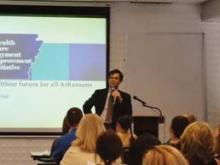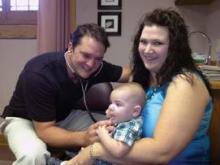Want to be paid extra for providing appropriate, cost-effective medical care? Doctors in Arkansas are about to find out what that’s all about as the state’s Medicaid program – along with two private insurance companies – kicks off a gainsharing program.
Under Arkansas’s Health Care Payment Improvement Initiative, health care payers have asked physicians and hospitals to keep costs for five high-volume episodes of care while still meeting quality standards. The episodes of care are perinatal care, attention deficit/hyperactivity disorder, upper respiratory infection, hip and knee replacement, and heart failure.
If providers succeed, they can share in the money saved by the insurers. If they don’t, they’ll need to return some of the excess fees.
"If you provide a service and you can do it with quality standards and good outcomes and do it less expensively than the other guy, we’re going to give you a bonus. The better doctors should do well," said Dr. William E. Golden, medical director of the Arkansas Medicaid program.
Other states, especially rural ones, will be watching how things play out in Arkansas, Dr. Golden said. "Everybody is going in this direction. We’ve just bitten off more of the apple faster than most."
The shift from simply paying for services provided to a cost-and-quality approach was undertaken in part to put the state’s Medicaid program on firmer financial footing ahead of the coming expansion in 2014 under the Affordable Care Act.
Right now, Arkansas’ Medicaid program is one of the few in the country that is actually solvent. But it won’t stay that way unless there are fundamental changes to how health care providers get paid, said Dr. Golden, also professor of medicine and public health at the University of Arkansas, Little Rock. By rethinking the way Medicaid pays for care, officials are hoping to avoid across the board cuts in providers’ pay or limits in beneficiaries’ eligibility, he said.
The program began in July with physicians getting report cards showing them how their 2011 performance might stack up under the new system. That past performance won’t count toward payment, but should give physicians an idea of whether they need to rethink some of their practices.
This fall, Medicaid will start collecting data; actual adjustments to pay won’t come for about a year.
The private payers involved in the gainsharing project – Arkansas Blue Cross Blue Shield and Arkansas QualChoice – will start their data collection in January 2013.
All together, about 1 million Arkansans will be affected by the program, Dr. Golden estimated.
Physicians have greeted the program with skepticism, mostly due to initial, confusing reports about what would be involved. When the program was first announced in 2011, it was billed as a bundling initiative that would have awarded a single payment to a group of physicians and would have let them figure out how to divide it.
Those bundling discussions left everyone "terrified," Dr. Golden said. So Medicaid officials and their private sector partners agreed to move to a hybrid, accountable care program.
Dr. Lonnie Robinson, a family physician in Mountain Home, Ark., said he had some significant concerns back when the program called for bundling payments. "That sounded like a recipe for strife and a food fight," he said.
Dr. Robinson said he doesn’t expect any major changes in his day-to-day operations, unless significant data entry is involved. Right now, most data will be taken from claims, though physicians may be asked to submit additional information for the attention deficit/hyperactivity disorder, hip and knee replacement, and congestive heart failure episodes.
For primary care, the upper respiratory infection episodes are likely to have the biggest impact, Dr. Robinson said. He said he’s excited about the program’s emphasis on not prescribing antibiotics unnecessarily.
"That’s something I’ve been preaching to my patients since I’ve been in practice," Dr. Robinson said. "Now I have the backup of the payer to say not only do I not think it’s indicated, they don’t really want to pay for it."
But from a financial perspective, this program won’t touch too many doctors, he said.
"I feel that most physicians who are practicing mainstream medicine are probably not going to be affected by this," Dr. Robinson said. "It’s going to be people that are on the fringe as far as high cost per episode that are probably going to have to make some adjustments."



